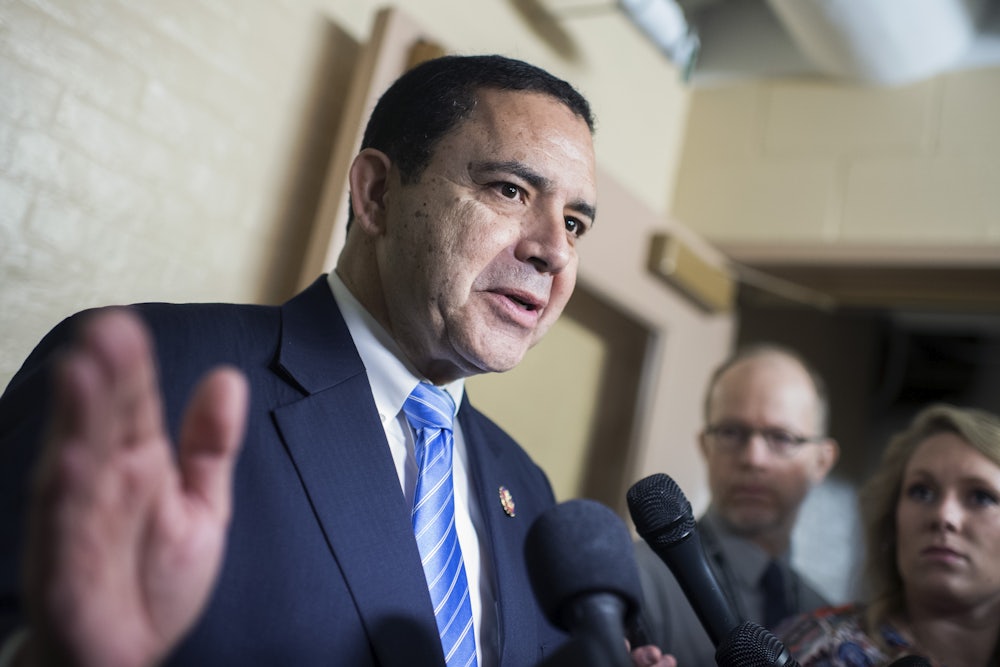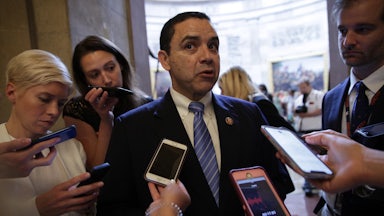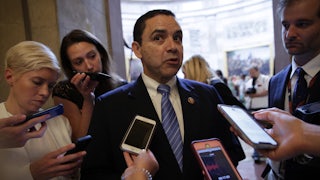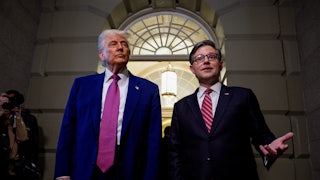How far does an incumbent Democrat have to go to lose the endorsement of their party’s leadership? That’s the question everyone should be asking as Henry Cuellar clings to his razor-thin margin in the Democratic primary runoff election in South Texas.
Some things probably fly below the radar, like being the House’s third-largest recipient of fossil fuel funding or obstructing his own party’s legislative agenda. Does the FBI raiding a candidate’s home as part of a probe into shady congressional ties to an autocratic petrostate cross the threshold into insupportability? It does not. If you thought being the House’s only anti-abortion Democrat with a firm stance against making Roe v. Wade the law of the land—as the Supreme Court looks poised to strike it down—would be a bridge too far, you would also be wrong. What about allies of said candidate apparently spreading fake news? Wrong again. Having an A rating from the NRA amid a slew of mass shootings, including the slaughter of at least 19 fourth graders at an elementary school not far from his district on the actual day of the election? Incredibly, even that’s not enough.
House Speaker Nancy Pelosi, House Majority Leader Steny Hoyer, and House Majority Whip Jim Clyburn stuck with Henry Cuellar through it all. As she bopped around cable news shows talking up the party’s commitment to abortion rights in the past few weeks, Pelosi’s voice could be heard on robocalls that went out to Laredo-area voters yesterday calling Congressman Cuellar a “fighter for hardworking families” who has “brought back millions of dollars.” Clyburn recorded one, too. The race they intervened in, in which longtime South Texas Congressman Henry Cuellar defended his seat from a second-time challenger, 29-year-old immigration attorney Jessica Cisneros, has yet to be called. With more than 95 percent of precincts reporting, he’s up by fewer than 200 votes.
Politicians who run parties by and large do not live with the consequences of their actions. Raking in campaign donations has a more immediate payoff for them than decarbonization, protecting abortion rights, or gun control. They and their colleagues, consultants, and friends can afford to move to temperate climes and away from wildfires, and to places where the right to an abortion isn’t under threat, should they or a loved one need one. They can send their kids to the kinds of expensive boarding schools that white supremacist mass shooters don’t tend to fire rounds into. Pelosi, Hoyer, and Clyburn do not have a material interest in making the United States a less violent country.
One might think they’d at least look out for the best interest of the party. But decades of guarding shrinking turf has left Democrats without much in the way of a leadership pipeline. They’ve cultivated a generation of milquetoast politicians seemingly conceived in a Democratic Congressional Campaign Committee petri dish whose passions consist of building common ground to find real-world solutions like defending access to affordable health care. None of these leaders have shown much interest in grabbing the reins away from now-octogenarian party elites, or even in preparing for a world where those elites finally retire. Making campaign call time productive affects them more, in the short run, than actually making good on any of their aggressively poll-tested promises.
Whether these politicians actually care about the causes they claim to care about is unknowable, and it isn’t the point. They might care, they might not; no amount of asking them to comment on this question is going to clear it up. What’s clear is that the consequences of Democratic timidity won’t actually affect the people who make sure Washington works this way. Climate action is “for the children,” Pelosi said earlier this month as India and Pakistan entered a third month of rolling 100-plus-degree temperatures. The Texas politicians who created the outdated, gas-powered grid that failed in 2021 aren’t the ones who suffered and died in the blackouts or will suffer in subsequent ones. Even if Cuellar ends up losing his seat as part of an expected blowout for Democrats this November, lame-duck opposition is a relatively comfy place to be. House Republicans refusing to recognize that a Democrat could win the White House gives them another chance to juice the #Resistance brand. Keeping a tight ship seems to be the only thing that matters, even if that ship is sinking.










